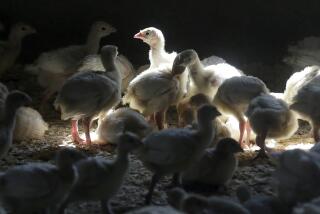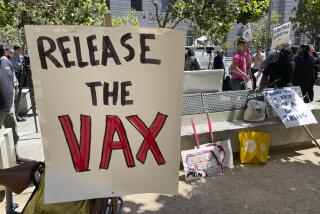Trials of 50-Year-Old Smallpox Vaccine Underway in U.S.
- Share via
In the 1950s, a pharmaceutical company in Pennsylvania created a stockpile of smallpox vaccine for the U.S. military, unaware that decades later, the frozen cache would be vital in protecting the entire country from the deadly airborne virus that has no known cure.
“We held on to it, just in case,” said Len Lavenda, spokesman for Aventis Pasteur in Swiftwater. But after the Sept. 11 attacks raised the specter of bioterrorism, the company agreed to hand over its more than 85 million doses of vaccine stock to the U.S. government.
On Monday, scientists began testing the effectiveness of the 50-year-old supply on more than 300 volunteers in Oakland, Calif.; Iowa City, Iowa; Nashville; and Houston as part of the government’s heightened post-Sept. 11 preparations for a biological attack.
Although a worldwide immunization campaign eradicated naturally occurring smallpox in the late 1970s, small quantities of the virus are stored at the U.S. Centers for Disease Control and Prevention headquarters in Atlanta and a similar lab in Russia. But U.S. officials are afraid some supplies may have fallen into the hands of rogue nations.
The U.S. is vulnerable because vaccinations against the disease haven’t been required here since 1972, and those inoculated likely would no longer be protected from infection. The vaccine confers full immunity for perhaps five to 10 years.
Production of the vaccine stopped in 1983. But because of concerns about bioterrorism, President Bush last month signed into law a $4.6-billion bioterrorism prevention program, of which $640 million went to producing and stockpiling the smallpox vaccine. Moreover, the government announced last week it would soon inoculate as many as 500,000 emergency workers as a precaution against an attack.
The vaccine is now offered only to lab workers who handle the virus. Last month, the Advisory Committee on Immunization Practices, which sets U.S. vaccine policy, rejected smallpox vaccinations for the general public.
“Most people would be susceptible if an outbreak occurred,” said Steve Black, co-director of the Kaiser Permanente Vaccine Study Center in Oakland, one of the four test sites sponsored by the National Institute of Allergy and Infectious Diseases. “It’s a gruesome possibility.”
The trials in Oakland, the University of Iowa, Vanderbilt University and Baylor College of Medicine will determine the side effects of the supply that was stored at Aventis Pasteur and whether it is still effective. If researchers find that it can be used, it could then be diluted to create an emergency supply large enough for the U.S., Canada and part of Mexico, Black said.
During the testing in Oakland, nurses are injecting diluted versions of the Aventis vaccine in about 40 to 50 people ages 18 to 32. Volunteers, drawn from a list of Kaiser members, will be paid $50 per visit and will keep a daily record of their physical symptoms, returning for periodic checkups and responding to follow-up telephone calls over the course of six months.
Black said many volunteers are not motivated by the money. Some are children of firefighters and police officers who seek to protect themselves and their families.
Although volunteers are not expected to have severe adverse reactions, the vaccine can cause rashes, brain swelling and, in severe cases, permanent brain damage and even death.
Infants younger than 1, pregnant women, people with eczema and similar skin diseases and those with immune disorders face greater risks from the vaccine. But even people without these risk factors could develop negative side effects or die. The chances of dying from the vaccine are about 1 in 1 million, Black said.
Young volunteers like Sarah Palmer, 20, of Oakland said her parents had been vaccinated when they were kids and suggested she do the same.
“I might end up staying home from work for a day,” Palmer said. “But the symptoms are unlikely so I wasn’t worried.”
Steven Pereira, an 18-year-old college student from San Francisco, said the benefits of vaccination outweigh the risks.
“If there was a terrorist attack and the vaccine works, I’ll be the first one vaccinated and won’t have to worry about catching disease,” Pereira said. “Also, I’ll be one of the people to test it for other citizens of the United States.”
In addition to starting the vaccine trials, the federal government is preparing plans in coming weeks for quarantining Americans exposed to smallpox.
The plans, soon to be circulated among top officials, address such questions as where people would be kept, possibly against their will, while officials confirmed their exposure and possibly administered vaccinations.
Associated Press contributed to this report.
More to Read
Sign up for Essential California
The most important California stories and recommendations in your inbox every morning.
You may occasionally receive promotional content from the Los Angeles Times.













